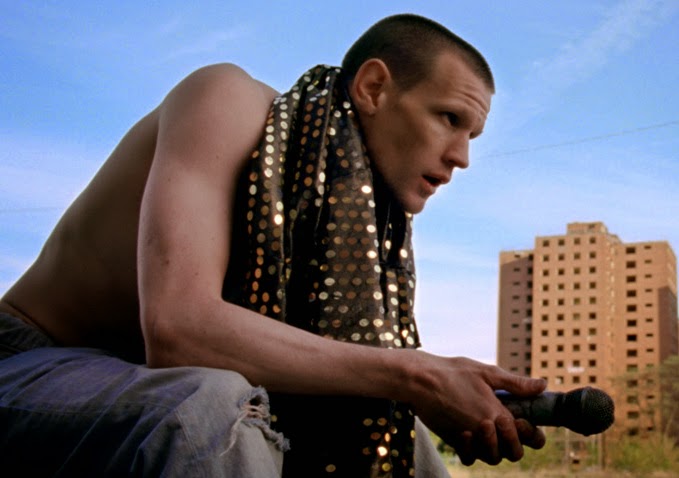First of all, I quite enjoyed 'Girl, Interrupted'. It's another film about a psychiatric ward, like a more serious version of 'It's Kind of a Funny Story' and a less good version of 'One Flew Over the Cuckoo's Nest'. After pondering deeply for a short while, I discovered the film came to some truly baffling, and slightly offensive, conclusions.
 |
| Wiona Ryder as Susanna |
For starters, there's the question of whether Susanna actually needs help.One would certainly think she does, the film opens with her having overdosed on aspirin, followed with a bottle of vodka, and her father's friend makes the damning comment 'you're hurting all the people you love'. We're reminded of the (I think much better) 'Prozac Nation', in which we're not only invited to sympathise with the protagonist suffering from depression, but also her friends and boyfriend who find her impossible to deal with. Plus she spends the film's exposition slipping Willy Loman style into the past (which is excellently done), and
he definitely could have done with some help. But then, it is fairly strongly implied that Susanna is not 'crazy' (their words), primarily by her hippy taxi driver (don't ask) and one of the more sympathetic doctors (played by Whoopi Goldberg) who tells her she's a selfish and spoilt child. Should we be sympathising with Susanna, or telling her to pull herself together?
Then there's the question of her diagnosis, which we are told is Borderline Personality Disorder. She complains after discovering this that the symptoms are just what it's like 'to be a person'. And with the summary we're given, we're attempted to agree with her: mood swings, self-alienation and 'promiscuity'. A quick look on Google added a few more symptoms which may make us take the disease more seriously: self-harm, delusions and hallucinations. There still seems to be the question of whether it classifies as a condition in itself or is just a handy label for people who don't fit into any other category, but either way, it's definitely not to be scoffed at.
Then there's the issues of Susanna's so called 'promiscuity'. She, quite reasonably, argues to Dr.
 |
| Bertha Mason: 'intemperate and unchaste' |
Wicke that what is promiscuous for a woman is perfectly normal for a man, but then Wicke reveals the 'damning' news that she committed two sex acts in a day with two different man, therefore she must be a nymphomaniac. This is definitely very silly, and the look on poor Wiona Ryder's face suggests that she now thinks she's a nymphomaniac. Personally, it reminded me of Mr. Rochester calling his 'mad' wife Bertha Mason 'intemperate and unchaste' in 'Jane Eyre'. We're also reminded of the long line of Biblical temptresses (Eve, Delilah, Bathsheba, etc.), and the clear link some people seem to draw between women, madness and uninhibited sexuality.
Next, is the film criticising or celebrating the mental health institutions of the 1960s? It does look suspiciously like they're over-medicating everyone, including sleeping pills and laxatives. And there is the suggestion that you simply have to tell the doctors what they want to hear and confess a dizzying array of character flaws before they let you out. This is confirmed by Lisa and Susannah visiting one of the released inmates when they escape, only to wake up the next morning to her having committed suicide. Susanna begins with a more positive view of her condition, which is quickly shot down as fluffy 1960s hippyism, as the patient who is characterised by embracing her illness (Lisa, played by a fabulous Angelina Jolie) is a raving lunatic. The film ends with Susannah healed by the hospital's fabulous treatment, and let out after a year. Forgive me if I'm a little confused.
 |
| Lisa: 'already dead' |
Now, Lisa and Susanna are juxtaposed in a number of ways. One of them embraces their condition and ends up in the hospital for life, the other plays the game and is released after a year. Potentially more importantly, Lisa champions openly telling people their flaws in utterly crushing tirades, and the other on the surface appears less judgemental, but in fact just writes down all her snide comments in her journal. Originally, Lisa's technique seems to be very, very wrong: her friend commits suicide because of her honesty and she doesn't seem to care. But then there's a rather unconvincing scene after the inmates have discovered Susanna's journal where Susanna is cornered by Lisa and is saved by telling her that she's 'already dead', at which point Lisa collapses into a teary heap. How is this helpful? Although some of Susanna's comments do at least seem constructive (telling her room-mate that she's living in a fairytale and secretly never wants to get back out into the world), she shockingly tells a patient who's set fire to half of her face that she only adopts a 'sweet' persona so people can bear to look at her. What's more, she's forgiven at the end! I wouldn't forgive her!
It has occurred to me that perhaps the reason that we can't solve these problems is because 'Girl, Interrupted' is a complex film about complex issues, with well rounded characters who we can never fully sympathise with or blame. Maybe we shouldn't be handed easy solutions on a plate. But the unconvincing ending where everyone forgives Susanna and the misogynistic suggestion that she's a nymphomaniac are definitely some of the film's weaknesses. And, is it just me, or do the soaring strings constantly in the soundtrack try and make the film a lot more uplifting than it really is,
Any film about mental health would undoubtedly be a matter of tiptoeing on thin ice, and this should not stop us trying to approach difficult subjects. Rant over.











